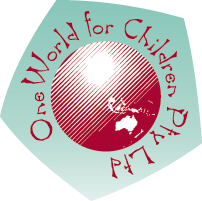Asthma
 Policy
Policy
One World Children’s Centre will not accept children into care until a current asthma management plan is completed and signed by their doctor. The child’s reliever medication, face mask and spacer must accompany them at the centre.
Relevant Legislation
Education and Care Services National Law Act 2010
Education and Care Services National Regulations 2011
Health Records Act 2001 (Vic)
National Quality Standard, Quality Area 2: Children’s Health and Safety
Information Privacy Act 2000 (Vic)
Privacy Act 1988 (Cth)
Public Health and Wellbeing Act 2008 (Vic)
Public Health and Wellbeing Regulations 2009 (Vic)
Background
Asthma is a chronic, treatable health condition that affects approximately one in 10 Australian children and is the most common reason for childhood admission to hospital. With good asthma management, people with asthma need not restrict their daily activities. Community education assists in generating a better understanding of asthma within the community and minimising its impact.
Symptoms of asthma include wheezing, coughing (particularly at night), chest tightness, difficulty in breathing and shortness of breath, and symptoms may vary between children. It is generally accepted that children under six years of age do not have the skills and ability to recognise and manage their own asthma without adult assistance. With this in mind, a service must recognise the need to educate staff and parents/guardians about asthma and promote responsible asthma management strategies.
Legislation that governs the operation of approved children’s services is based on the health, safety and welfare of children, and requires that children are protected from hazards and harm. The Approved Provider will ensure that there is at least one educator on duty at all times who has current approved emergency asthma management training in accordance with the Education and Care Services National Regulations 2011. As a demonstration of duty of care and best practice, One World Children’s Centre recommends all educators have current approved emergency asthma management training.
Definitions
Approved Emergency Asthma Management (EAM) training: Training that is approved by the National Authority in accordance with Division 7 of the National Regulations, and is listed on the ACECQA website: http://www.acecqa.gov.au. EAM training provides knowledge about the underlying causes of asthma, asthma triggers, and the recognition and treatment of an asthma attack.
Asthma Action Plan: A record of information on an individual child’s asthma and its management, including contact details, what to do when the child’s asthma worsens and the treatment to be administered in an emergency. Asthma Action Plan templates can be downloaded from The Asthma Foundation of Victoria’s website: www.asthma.org.au
Asthma emergency: The onset of unstable or deteriorating asthma symptoms requiring immediate treatment with reliever medication.
Asthma first aid kit: Kits should contain:
- reliever medication
- 2 small volume spacer devices
- 2 compatible children’s face masks
- record form
- asthma first aid instruction card.
The Asthma Foundation of Victoria recommends that spacers and face masks are for single-use only. It is essential to have at least two spacers and two face masks in each first aid kit, and these should be replaced once used.
Asthma triggers: Things that may induce asthma symptoms, for example, pollens, colds/viruses, dust mites, smoke and exercise. Asthma triggers will vary from child to child.
Duty of care: A common law concept that refers to the responsibilities of organisations to provide people with an adequate level of protection against harm and all reasonable foreseeable risk of injury.
Medication record: Contains details for each child to whom medication is to be administered by the service.
Metered dose inhaler (puffer): A common device used to administer reliever medication.
Puffer: The common name for a metered dose inhaler.
Reliever medication: This comes in a blue/grey metered dose inhaler containing salbutamol, a chemical used to relax the muscles around the airways to relieve asthma symptoms. This medication is always used in an asthma emergency. Reliever medication is commonly sold by pharmacies as Airomir, Asmol, Epaq or Ventolin.
Spacer device: A plastic device used to increase the efficiency of delivery of reliever medication from a puffer. It should always be used in conjunction with a puffer device and may be used in conjunction with a face mask.
The Approved Provider (or delegate) is responsible for:
- providing the Nominated Supervisor and all staff with a copy of the service’s Asthma Policy, and ensuring that they are aware of asthma management strategies upon employment at the service
- providing approved Emergency Asthma Management (EAM) training (refer to Definitions) to staff as required under the National Regulations
- ensuring at least one staff member with current approved Emergency Asthma Management (EAM) training is on duty at all times
- ensuring the details of approved Emergency Asthma Management (EAM) training are included on the staff record
- providing parents/guardians with a copy of the service’s Asthma Policy upon enrolment of their child
The Nominated First Aid Officer is responsible for:
- ensuring adequate provision and maintenance of asthma first aid kits (refer to Definitions)
- ensuring the expiry date of reliever medication is checked regularly and replaced when required, and that spacers and face masks are replaced after every use
- ensuring that the service meets the requirements to be recognised as an Asthma Friendly Children’s Service with The Asthma Foundation of Victoria
- displaying Asthma Australia’s Asthma First Aid poster in key locations at the service
The Centre Co-ordinator is responsible for:
- identifying children with asthma during the enrolment process and informing staff
- providing parents/guardians with an Asthma Action Plan to be completed in consultation with, and signed by, a medical practitioner
- developing a Risk Minimisation Plan for every child with asthma, in consultation with parents/guardians
- ensuring that all children with asthma have an Asthma Action Plan and Risk Minimisation Plan filed with their enrolment record
- ensuring a medication record is kept for each child to whom medication is to be administered by the service
- ensuring parents/guardians of all children with asthma provide reliever medication and a spacer (including a child’s face mask, if required) at all times their child is attending the service
- implementing an asthma first aid procedure consistent with current national recommendations
- ensuring that all staff are aware of the asthma first aid procedure
- facilitating communication between management, educators, staff and parents/guardians regarding the service’s Asthma Policy and strategies
- identifying and minimising asthma triggers for children attending the service, where possible
- ensuring that children with asthma are not discriminated against in any way
- ensuring that children with asthma can participate in all activities safely and to their full potential
- immediately communicating any concerns with parents/guardians regarding the management of children with asthma at the service
- ensuring that medication is administered in accordance with the Administration of Medication Policy
- ensuring that when medication has been administered to a child in an asthma emergency without authorisation from the parent/guardian or authorised nominee, the parent/guardian of the child and emergency services are notified as soon as is practicable
- compiling a list of children with asthma and placing it in a secure, but readily accessible, location known to all staff. This should include the Asthma Action Plan for each child
- ensuring that induction procedures for casual and relief staff include information about children attending the service who have been diagnosed with asthma, and the location of their medication and action plans
- ensuring programmed activities and experiences take into consideration the individual needs of all children, including any children with asthma.
The Certified Supervisors and other educators are responsible for:
- ensuring that they are aware of the service’s Asthma Policy and asthma first aid procedure (refer to Attachment 1)
- ensuring that they can identify children displaying the symptoms of an asthma attack and locate their personal medication, Asthma Action Plans and the asthma first aid kit
- maintaining current approved Emergency Asthma Management (EAM) (refer to Definitions) qualifications
- identifying and, where possible, minimising asthma triggers (refer to Definitions) as outlined in the child’s Asthma Action Plan
- taking the asthma first aid kit, children’s personal asthma medication and Asthma Action Plans on excursions or other offsite events
- administering prescribed asthma medication in accordance with the child’s Asthma Action Plan and the Administration of Medication Policy of the service
- developing a Risk Minimisation Plan for every child with asthma in consultation with parents/guardians
- discussing with parents/guardians the requirements for completing the enrolment form and medication record for their child
- consulting with the parents/guardians of children with asthma in relation to the health and safety of their child, and the supervised management of the child’s asthma
- communicating any concerns to parents/guardians if a child’s asthma is limiting his/her ability to participate fully in all activities
- ensuring that children with asthma are not discriminated against in any way
- ensuring that children with asthma can participate in all activities safely and to their full potential.
Parents/guardians are responsible for:
- reading the service’s Asthma Policy
- informing staff, either on enrolment or on initial diagnosis, that their child has asthma
- providing a copy of their child’s Asthma Action Plan to the service and ensuring it has been prepared in consultation with, and signed by, a medical practitioner. The Asthma Action Plan should be reviewed and updated at least annually
- ensuring all details on their child’s enrolment form and medication record are completed prior to commencement at the service
- working with staff to develop a Risk Minimisation Plan for their child
- providing an adequate supply of appropriate asthma medication and equipment for their child at all times
- notifying staff, in writing, of any changes to the information on the Asthma Action Plan, enrolment form or medication record
- communicating regularly with educators/staff in relation to the ongoing health and wellbeing of their child, and the management of their child’s asthma
- encouraging their child to learn about their asthma, and to communicate with service staff if they are unwell or experiencing asthma symptoms.
Asthma is an unpredictable condition with trigger factors, signs and symptoms that vary with each person. We ask that if your child has been diagnosed as an asthmatic, that you and your child’s doctor complete an asthma management plan for the Centre, prior to the commencement of care.
By signing the management plan you are authorising staff to administer your child’s asthma medication, according to the plan, for the stated signs and symptoms.
Your child’s asthma medication must accompany your child on each visit to the Centre.
If your child is unable to participate in the daily program due to asthma, you or your emergency contacts will be contacted by a member of staff.
Sources
Asthma Australia: www.asthmaaustralia.org.au
The Asthma Foundation of Victoria: www.asthma.org.au or phone (03) 9326 7088 or 1800 645 130 (toll free)
Australian Children’s Education and Care Quality Authority (ACECQA): www.acecqa.gov.au
Guide to the Education and Care Services National Law and the Education and Care Services National Regulations 2011, ACECQA
KPV Early Childhood Management Manual
This policy was written in consultation with The Asthma Foundation of Victoria. The Foundation’s Asthma & the Child in Care Model Policy has been incorporated into this policy by KPV. For more detailed information, visit The Asthma Foundation of Victoria’s website: www.asthma.org.au





 One World for Children Acknowledgement of Country: Here is the land; Here is the sky; Here are my people and here am I. We give thanks to future, present and past; Ancestors and Elders and the connection that lasts. We acknowledge the Wathaurong people on whose land we learn and play; We promise to look after it every day. ©
One World for Children Acknowledgement of Country: Here is the land; Here is the sky; Here are my people and here am I. We give thanks to future, present and past; Ancestors and Elders and the connection that lasts. We acknowledge the Wathaurong people on whose land we learn and play; We promise to look after it every day. ©